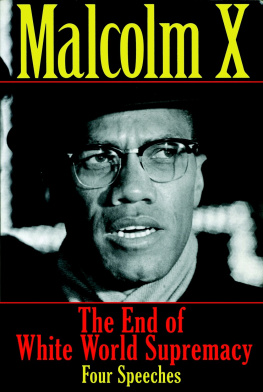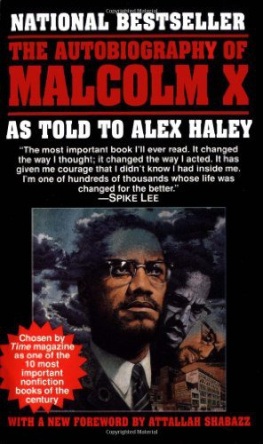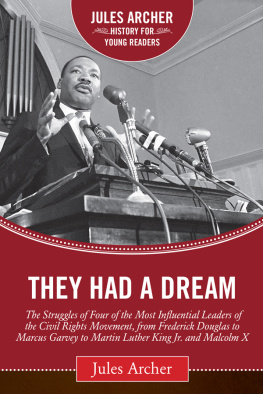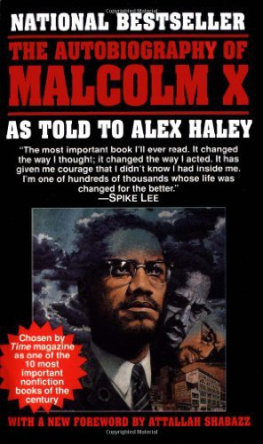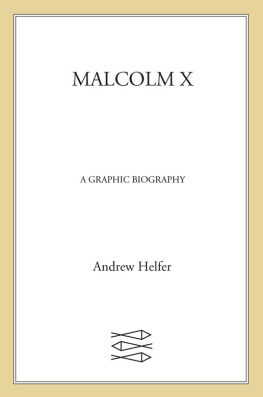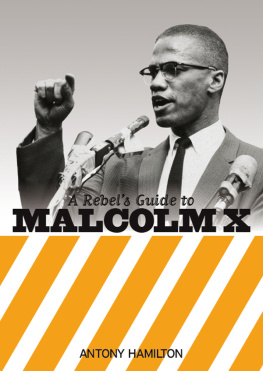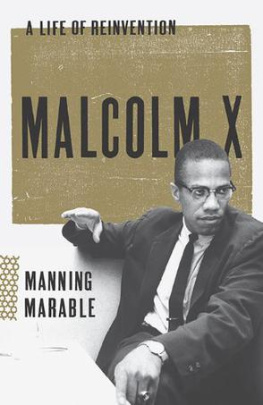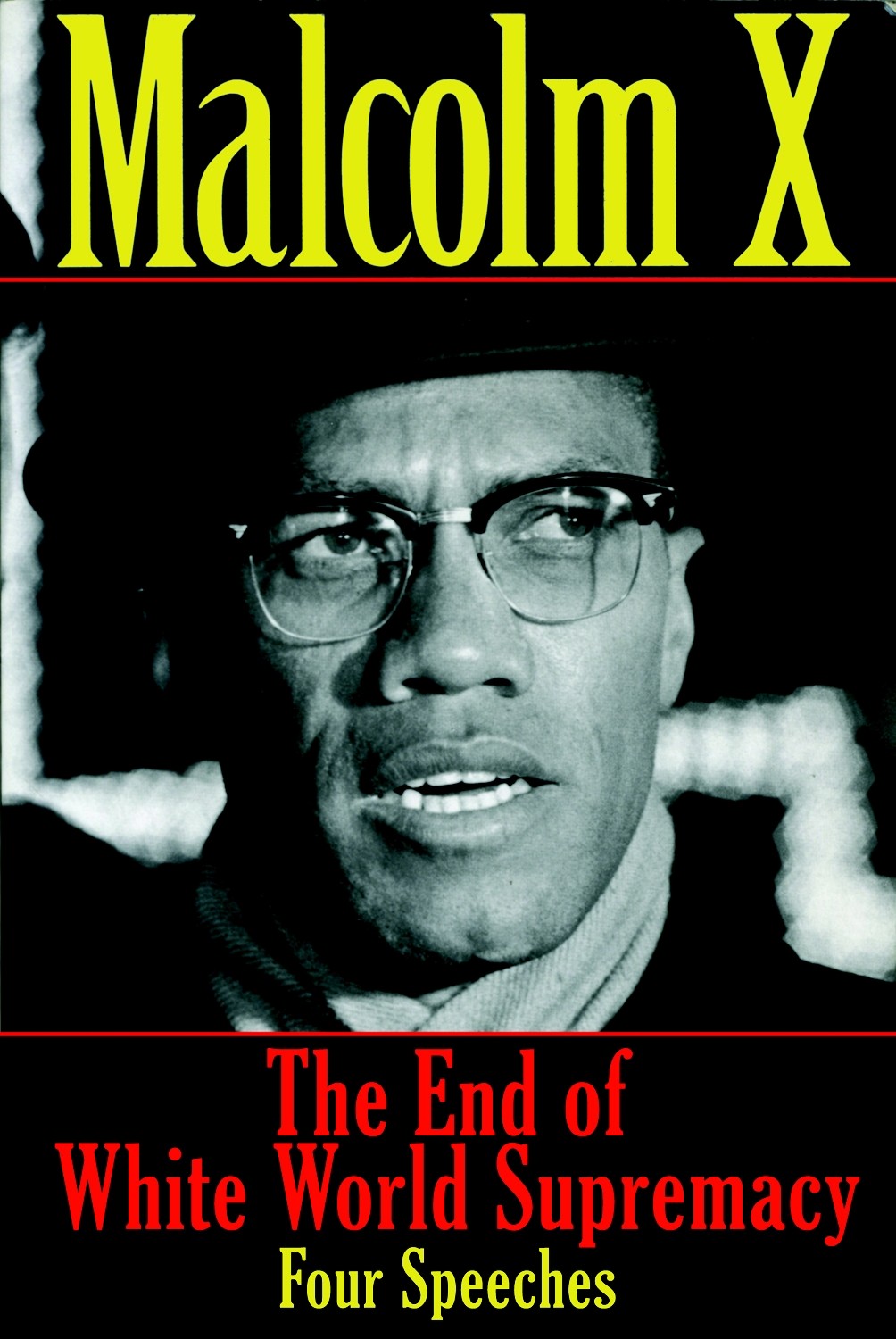The end of white world supremacy: four speeches by Malcolm X / Malcolm X, edited and with an introduction by Imam Benjamin Karim. p. cm.
Reprint. Originally published: New York: Merlin House ; Distributed by Monthly Review Press, 1971.
1. African AmericansCivil rights. 2. African AmericansRace identity. 3. African AmericansHistory. 4. Black Muslims. I. Karim, Benjamin. II. Title.
Introduction by Imam Benjamin Karim
Malcolm X was Minister of Temple Number 7, at Lenox Avenue and 116th Street, from 1952 to December, 1963. Temple Number 7earlier known as the Muhammad Temple of Islam and later as Muhammads Mosque Number 7was the most important Muslim temple in America, outside of the Chicago headquarters, and Malcolm, as its spiritual leader, was Elijah Muhammads most articulate disciple. In addition to his temple lectures, which in the early days he delivered personally three times a week, Malcolm wrote regular columns for a number of black or black-oriented newspapers, and thus was widely known to at least a certain segment of the black community. But until 1957 he was virtually unknown to the public-at-large, that is to say White America, which pays little or no heed to black activities so long as they dont spill over or threaten the white status quo.
I, like most blacksor Negroes as we then called ourselveshad heard of Malcolm X prior to 1957, but my idea of him was confused and, undoubtedly, erroneous. I vaguely knew him to be a black nationalist and the leader of the religious group called the Muslims, who were often referred to in Harlem as Gods Angry Men. What brought them, and Malcolm as their leader, to my attention was an incident that occurred early in the spring of 1957.
Late in the evening of April 26, 1957, three men, two of whom were later identified as Muslims, were witness to an altercation between the police and a man the police had accused of beating an unidentified woman. As the police started working over their victim, a man named Reese Poe, the three men began to remonstrate with them. Youre not in Alabama, one of the Muslims, Hinton Johnson, was reported to have called out, this is New York. At first the police merely ordered Johnson and his companions to move on. When they refused they were placed under arrest and taken to the 28th Precinct station house, but not before one of the policemen, Patrolman Mike Dolan, had hit Johnson with his nightstick.
The subsequent chain of events, which is worth relating in detail for a number of reasons, was reported as follows by The Amsterdam News:
A woman who had witnessed the incident then rushed to the Moslem restaurant on Lenox Avenue and told the Moslems that one of the brothers had been beaten by a policeman.
A group of Moslems, led by their spiritual leader Minister Malcolm X, then went to the station house and asked to see their brother. Mr. X claims that the police first told him that they did not have such a man in the station.
But as the word passed through Harlem the Moslem crowd swelled around the station house and finally police admitted that they did have the Moslems inside.
The Moslems asked to see their brother. Mr. X was permitted to see Hinton. He claims that Hinton told him that when he had been brought into the station house he was suffering from the blows of the nightstick and that in his pain he fell down on his knees to pray.
He told Mr. X that when he was on his knees praying in the station house the lieutenant in charge came upon him and hit him across the mouth with a nightstick and also hit him on his shins with the stick.
Mr. X demanded that Hinton be sent to a hospital for attention. Police finally agreed and sent him to Harlem Hospital.
While he was being treated there the Moslems, joined by a group of Nationalists and other Harlemites, congregated into a crowd of 2,000 outside the hospital.
As the crowd grew, police rose to the emergency and all available cops were pressed into duty, with Deputy Inspector McGowan taking command.
Then, to the surprise of all, Hinton was released from Harlem Hospital and taken back to the 28th Precinct, where he was placed in a cell.
The Moslems followed. They formed a solid line half a block long in front of the 123rd Street station house and waited orders from their leaders. Their discipline amazed police, and more than one high-ranking officer expressed growing concern.
By this time Mr. X was in the station house with his attorney, Charles J. Beavers of 209 W. 125th Street. They arranged for bail for Pots and Tall and then asked to see Hinton.
When Attorney Beavers saw Hintons condition he immediately asked that he be sent to the hospital, charging that he was in no condition to remain in jail.
But police flatly refused, saying that he had already been to the hospital. They said Hinton must remain in a cell for arraignment in court Saturday morning....
It was 2:30 A.M. by this time. But the Moslem followers were still in front of the station house. Mr. X left the station house, gave one brief command to his followers, and they disappeared as if in thin air.
One amazed policeman, on seeing this, said: No one man should have that much power!
What the policemanwho was later identified by the writer of the article, James Hicks, as being Deputy Inspector McGowan himselfmeant, of course, was: No one black man should have that much power. But it was that same power and presence which so impressed and frightened the police that also attracted me and thousands of other young so-called Negroes to Malcolm. Here was a man who could walk boldly into the jaws of the lion, walk proud and tall into the territory of the enemy, the station house of the 28th Precinct, and force the enemy to capitulate. Here was a man who could help restore the heritage, the pride of race and pride of self, that had been carefully stripped from us over the four hundred years of our enslavement here in White America. I knew, when I first heard of the Hinton Johnson incident, that, at the very least, I had to go and hear this man. But before relating, briefly, my first contact with Malcolm, it is worthwhile detailing the subsequent events of that weekend, for what they reveal about Malcolms stubborn devotion to his followers and about the methods of the police in Harlem.

